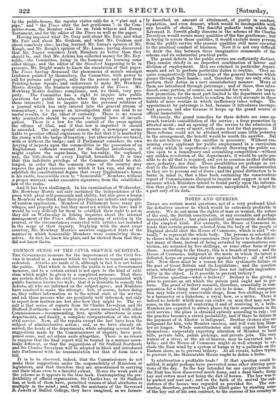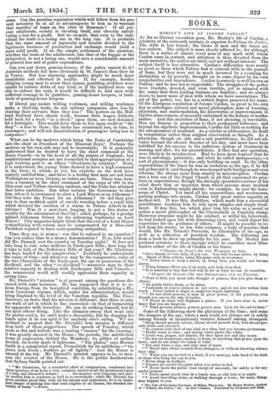NOTES AND QUERIES.
Tneee are certain moral questions, not of a very profound kind, the definitive answer to which would be extremely profitable to society. We do not mean the rights of man or woman, the nature of the soul, the British constitution, or any recondite and perhaps inscrutable subject ; but plain political and mercantile definitions of the simplest kind. For example, the House of Commons in- tends that certain persons selected from the body of the people of England should elect the House of Commons, which is said " vir- tually " to represent the whole body. The persons so selected are to choose who in their own conscience they believe to be the fittest : but many of them, instead of being actuated by conscientious con- viction, are actuated by five shillings, or some other form of pur- chase. According to the theory, this is a breach of trust ; and the House of Commons, indignant at the mode in which its intent is defeated, keeps on passing statutes against bribery; all of which fail. Now there must be a reason for this systematic failure on the part of Great Britain and its Legislature ; and the question arises, whether the perpetual failure does not indicate impractica- bility in the object. Is it possible to prevent bribery ?
Previous question—what is bribery ? Bribery is the giving a price to procure an act which the person paid ought not to per- form. The proof of bribery consists, therefore, essentially in com- pensation for a thing that ought not to be done. But compensa- tion may take every conceivable shape, from five shillings or less to a baronetcy or a dukedom, a royal bow, or a mitre. There is indeed no benefit which man can confer on man that may not be- come, in the manner of conferring it and of receiving it, a bribe. Members are expected to obtain places for their constituents in the civil service ; the place is obtained entirely according to rule; but the practice becomes a stated probability, and if there be failure in the payment of it Elector is indignant. Brother electors also are indignant for him, vote Member careless, and will vote him Mem- ber no longer. Whole constituencies also will expect bribes for themselves ; corporately expecting attention of Member to local bills, private bills, parish pickings, and private jobs. The very waters of a river, or the air of heaven, may be converted into a bribe ; and the House of Commons might as well attempt to ex- clude the East wind by a system of bungs or by a pallisade on th. e Eastern shore, as to prevent bribery. At all events, before trying to prevent it, the Honourable House ought to define a bribe.
Is adulteration a profitable trade ? If that question could be settled, it might perhaps have prevented some other stirring ques- tions of the day. In the hay intended for our cavalry-horses in the East has been discovered much damp, and a dead lamb; damp hay and rotten meat not being the diet of horses. The hay was to be packed and sent out ; and on the faith of its arrival the sub- sistence of the horses was regarded as provided for. The con- tractor, therefore, preferred to pilfer illicit gains by stealing 13 0130 of the hay out of his own contract, to the success of his country in arms. Can the peculiar reputation which will follow from his pre- sent notoriety be at all so advantageous to him as to warrant that sacrifice of lamb on the altar of Mammon? If all per- sons adulterate, society is cheating itself, and cleverly substi- tuting a loss for a profit. But we suspect, that even to the indi- vidual the trade is a losing one in the long run. It is probable that the same amount of ingenuity and trouble devoted to the legitimate business of production and exchange would yield a more solid profit. If so, the simple settlement of the question, whether the trade of the adulterator, like that of the beggar or the pickpocket, is not a losing one, would save a considerable amount of general loss and of police expenditure.
Can you put down gaming-houses, if the police cannot do it ? Austrian methods fail more obviously in St. James's than they do in Venice. But less alarming approaches might be much more formidable and effectual in reality. If, for example, besides obliging young men to avow their names, gambling creditors were unable to enforce debts of any kind, or if the landlord were un- able to enforce his rent, it would be difficult to find men with sufficient courage to be gamblers, gaining-house keepers, or land- lords of gaming-house keepers.
If liberal pay makes willing workmen, and 'willing workmen make a thriving trade, do not railway companies save less by stinting their servants than they lose ? The porters on the Mid- land Railway have struck work, because their wages, hitherto held back for a week "as a check" upon them, are now detained for a fortnight. This would drive them to live upon credit at "the shop "—a loss to them; the strike has occasioned loss, in time, to passengers; and will not dissatisfaction of passengers bring loss to companies ?
What can be the motives which bring the Duke of Cambridge into the chair as President of the Bluecoat Boys? Perhaps the motives on his own side may not be inscrutable. It is generally understood that he desired to have the chief command at the Horse Guards—to be the head a all the armies of England ; but constitutional scruples are not reconciled to that appropriation of a high working post to an officer "illustrious by courtesy." Next, it is understood, the young Duke desired to have a high command in the East ; to which, as yet, his exploits on the field have scarcely entitled him; • and there is a feeling that men are not born Wellingtons or even Pictons, as rulers are born. There was, how- ever, a vacancy in the chief command of the corps of 600 in the Blue-coat and Yellow-stocking uniform, and the Duke has attained that latter ambition. But what induces the Governors to elect him, when it is customary to elect a Lord Mayor or an Alderman ? Did they take the Prince for an Alderman ? Or did they give way to that snobbish spirit of servile worship before a royal title which dictated the erection of a statue to Prince Albert in his lifetime ? Was it a new-born longing to get a live statue of royalty for the adornment of the City; aided, perhaps, by a grudge against Alderman Sidney for his reforming tendencies as Lord Mayor? City magnates might think that the evil of a Lord Mayor sympathizing with reform may be compensated by a Blue-coat President reputed to have corresponding antipathies.
Time, they say, is money : can this be reduced to an equation? Can you reduce time to a money denomination ? If so, how much did Mr. Disraeli cost the country on Tuesday night ? It does not take long to vote some millions in Exchequer Bills ; how long did it take to talk of the Deficiency Bills of last year? Mr. Gladstone has been lauded for his compression.* Evidently he understands the value of time ; and whatever may be the comparative value of the two Chancellors of the Exchequer, the one in possession of the dividend, and the other "ex-dividend"—whatever may be their relative capacity in dealing with Exchequer Bills and Consols— the commercial world will readily appreciate their capacity in saving time.
Mr. Disraeli's " mission " is at present among the questions dis- cussed with some keenness. He has suggested that it is to re- deem Europe from its benighted condition, by establishing a He- brew Caucasian regime, which, under his administration, would bring England to the level of the Venetian republic. The Times discovers, ex facto, that his mission is different; that there is only one walk of art in which he has succeeded—in that of tormenting his opponents with invective. He can do nothing himself, but he can spoil others' doing. Like the chimney-sweep that went into the pastry-cook's, he can't make a cheesecake, but by clapping his hands upon it he can spoil it for anybody else's eating. We are inclined to suspect that Mr. Disraeli's true mission is different from both of these suggestions. The speech of Tuesday, which reads so fiat and hollow, was a roaring " success " for the evening : it was greatly cheered in the House ; the periods, the antithetical forms of expression, tickled the Members ; its glitter of surface dazzled, its levity made it lightsome. "Tin plates," says Horace Smith in a commercial report, Disraelitish for its antithesis—" tin plates look lively ; feathers go off lightly." And the House is amused at the toy. Mr. Disraeli's mission appears to be, to mea- sure the wisdom of the House. He is the public desideratum that Sydney Smith pointed out.
* "Mr. Gladstone by a wonderful effort of compression, condensed into three-quarters of an hour a very complete answer to all the prominent topics of a long and discursive debate ; . . . . his mastery over language and mat- ter enables him to condense as well as to overwhelm ; while Mr. Disraeli has given another proof that, with all his talents and experience, he is in immi-
danger of sinking into that least eligible of all classes, the dreaded fra- ternity of borea."—Titnes.



































 Previous page
Previous page